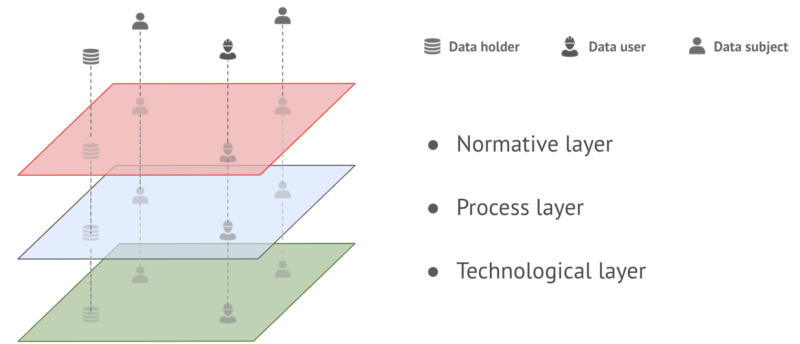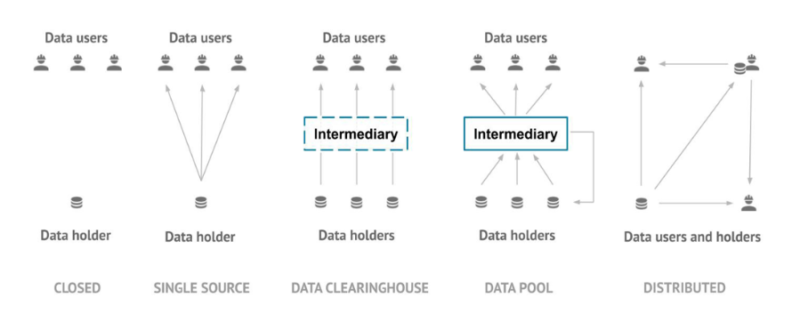
Data Governance 1: Finding common ground for interdisciplinary research
Sharing and reusing digital data can enhance innovation and increase economic and social prosperity. However, economic and legal barriers as well as uncertainties often seem to prevent organizations from sharing the data they control. The Data Governance project series therefore aims to explore data governance models that help stakeholders share and reuse their data.
Literature research and exchange with academia and practice
To achieve this goal, the research team researched literature reflecting the respective legal debate (especially in data protection law and intellectual property law), the economic discussion (especially in the field of open innovation) and the political science perspectives (especially on governance and regulation) in the first project “Defining a common research base”. In addition, the research team conducted initial informal desk studies on existing data governance structures in various societal contexts, such as the automotive and advertising industries, the health sector and smart cities.
Definition of a common terminology
The research team did not, however, come across successful and comparable data governance models that effectively help stakeholders share and reuse their data. Rather, it found very heterogeneous and ambiguous terminology used in both theory and practice. This made it conceptually impossible to compare the discussed data governance phenomena in terms of their success characteristics.
Therefore, the research team took several steps back from its original goal and began to develop a common research basis. In this, it first defined what the goal and challenges of successful data governance should be. The group then developed initial “archetypes” of data governance models that can serve as a starting point for more differentiated conceptual and empirical work in the future.

Fig. 1: Data Governance Layers
Goals and challenges of successful data governance
The goal of successful data governance, according to the proposed research base, is to reconcile the conflicting interests in data sharing and reuse. In doing so, all stakeholders involved – which is the first challenge – need to coordinate at the different governance levels (i.e. normative, organisational and technological).
The second challenge is that the interests involved in data sharing and reuse (i.e. what the value of data is and what the risks of processing it are) only become concrete in the course of data processing. Therefore, the value of data and the risks they pose can only be determined in advance to a very limited extent. This makes resolving this conflict of interest a rather dynamic (and delicate) process in practice.
Research on data governance – especially its coordination efforts – ultimately means, in the view of the research group, providing an evidence-based foundation for any regulatory enterprise. This methodological insight is particularly important for legislators seeking to regulate the sharing and reuse of data, such as the European Commission in its European Data Strategy.
5 Archetypes of Data Governance
Based on a literature review of existing models for sharing intellectual property rights, such as patents, the research team finally applied these models to the data economy to define five archetypes of data governance.

Fig. 2: Data Governance Archetypes
It was aware that governance models from the IPR field do not fit data governance and that the archetypes developed are very general. Nevertheless, they provide an accurate overview of the main features of data governance structures between entities that share (or do not share) data.
Duration: 2018-2020
Funding: HIIG
 Maximilian von Grafenstein, Prof. Dr.Associated Researcher, Co-Head of Research Programme
Maximilian von Grafenstein, Prof. Dr.Associated Researcher, Co-Head of Research Programme
-
 Alina WernickFormer Associated Researcher: Data, actors, infrastructures
Alina WernickFormer Associated Researcher: Data, actors, infrastructures -
 Christopher OlkStudent Assistant: Innovation & Entrepreneurship
Christopher OlkStudent Assistant: Innovation & Entrepreneurship -
 Irma KlünkerFormer student assistant: Data, actors, infrastructures
Irma KlünkerFormer student assistant: Data, actors, infrastructures
Journal articles and conference proceedings
Grafenstein, M. v., Wernick, A., & Olk, C. (2019). Data Governance: Enhancing Innovation and Protecting Against Its Risks. Intereconomics, 54 (4), 228-232. DOI: 10.1007/s10272-019-0829-9 Publication details
Other publications
Lectures and presentations
Data-Driven Economy Challenges and Opportunities.Data Governance and Smart Cities (Session: Regulation and Governance). Intereconomics / IW (German Economic Institute). Hamburgische Landesvertretung, Berlin, Deutschland: 17.06.2019 Further information
Max von Grafenstein
Data Governance - Elaborating on a Research ConceptTowards health futures: digital innovation, infrastructure, and entrepreneurship on bio data (Session: Propositions for research on bio data). Freie Universität Berlin. Einstein Center for Digital Futures, Berlin, Germany: 07.03.2019 Further information
Alina Wernick
Organisation of events
Workshop sessionWorkshop# 182: Data Governance for Smarter City Mobility at Internet Governance Forum 2019. From 28.11.2019 to 28.11.2019. Estrel Berlin, Berlin, Germany. Co-Organised by: Alina Wernick, Maximilian von Grafenstein, Li-hsien Chang, Natalie Kreindlina, Christopher Olk (International) Further information
Li-hsien Chang, Natalie Kreindlina, Alina Wernick, Maximilian von Grafenstein
Data Governance: Between Concepts and Case Studies02.07.2019. Humboldt Institute for Internet and Society, Berlin, Germany (International)
Natalie Kreindlina, Alina Wernick, Christopher Olk, Maximilian von Grafenstein
Who holds a stake in Smart City Data?From 15.04.2019 to 15.04.2019. Humboldt Institute for Internet and Society, Berlin, Germany (International)
Alina Wernick, Christopher Olk, Maximilian von Grafenstein

